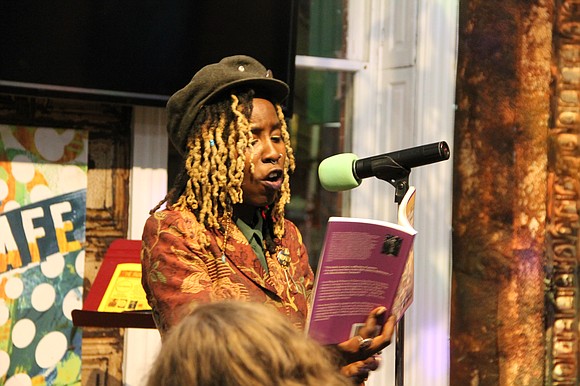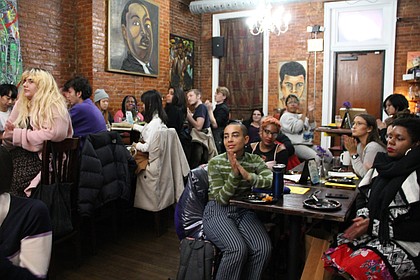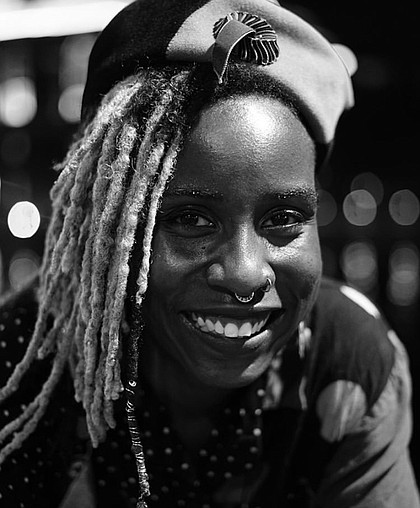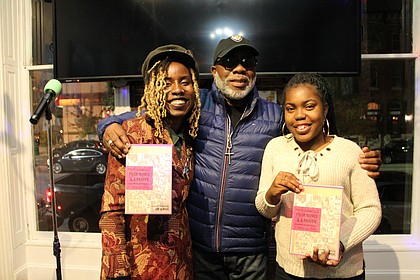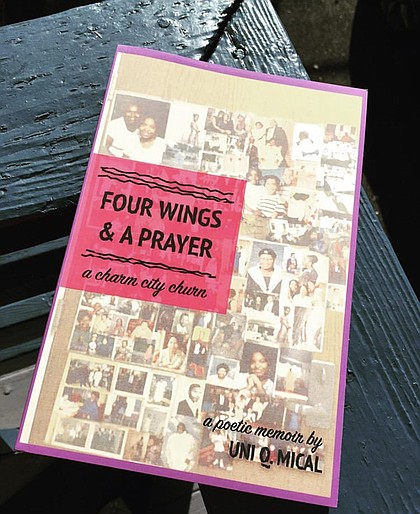Uni Q celebrates the release of their first self published book. ‘4 Wings and a Prayer’ (4WNAP) with a poetry reading party at Terra Cafe. (101 E 25TH, ST, 21218)
I had the pleasure to attend this phenomenal book release and Poetry Party at Terra Cafe and it was truly a UNIque experience. Uni read exclusive, never before heard out loud poems from Four Wings and A Prayer, alongside some incredibly talented students from their Frameworks Course (aka #Decolonizingyourmind) The students from THE Chezia Thompson’s Course read their poetry as well.
Cieara A. Adams
Guest and Participants at the 4WNAP poetry party and book release. Terra Cafe
Unique Mical Robinson is a queer writer, performer, host, artivist, educator, & proud Baltimore native.Since age 13, she has had the fortune of connecting and performing with various communities throughout the US, and even Havana, Cuba. She received her MFA in English & Creative Writing from Mills College in 2014, and holds a BA in Creative Writing/Black Studies from Hampshire College in 2009. In her lifetime, her passion has led her to ensure healing and resources remain accessible to all. She has worked in a number of activist circles, artist collectives, and direct action campaigns, including increasing funding for Baltimore City Public Schools in her youth, affordable housing for people with HIV/AIDS and ending police harassment of people of color, as a Community Organizer for VOCAL-NY in Brooklyn, NY, Reproductive Justice for women of color, and increasing mass visibility of LGBTQ+ issues and identities. She worked as an Academic Mentor for youth in Oakland’s Unified School District, and upon returning to Baltimore in 2015, became a Teaching Artist and Program Director/Operations Manager for DewMore Baltimore.
Eboni Sellers
Uni Q Mical
In addition to being Humanistic Studies Faculty at MICA (oldest continuously degree-granting college of art and design in the nation in Baltimore), she is also an award-winning Poetry/Theater Arts Integration Educator with Baltimore City School students, and Co-Founder of blkottonkandy, an arts & wellness initiative.
PLEASE CHECK OUT THE INTERVIEW BELOW:
Is there a desired demographic of readers you’d like your book to appeal to?
The folks that grew up in a generation of the 1980’s/1990’s and had to live through a lot of things that we just genuinely did not understand but I was a kid that always wanted to understand how things got to be the way that they are, so this is a book for the folks that lived through some very trying hard times, some failed policies, and we were kind of the result of that, but this is also for the people not from Baltimore but who have experienced similar plight growing up in other cities, so black youth. I had a friend in DC who was really moved by it because of what she experienced. Black youth everywhere, Brown youth everywhere, it’s for queer folks, it’s for white folks who might not know the other side of the story but dare to take a glimpse into it, this is our story…forreal.
What led you to self publish?
(laughs) So honestly it was out of necessity, I was broke (Laughs) when I moved back to Baltimore, so this whole manuscript was actually my grad school thesis. 2013 around that time I started writing it and I was looking at my folks, my cohorts, colleagues if you will and especially fiction writers they all had to find agents and do all these things and like get somebody that’s going to publish their stuff and it just felt arbitrary to me, the process of it and I was like what are people doing that I can’t do?, what did they learn they I can also learn?,you know what I mean? It can’t be difficult and in the process of writing I basically released a “Chapbook” And I realized how easy that process was, it was a bunch of formatting and different things like that and me being the editor of my script, once I was done with it I was like there’s no way I cant possible figure out how to do this myself, right? And just talking to other people and other friends of mine who have released and self published things through amazon, kindle, create space all of these different places and I was like “ Oh” the platform is there, I just need to walk into it and get over those self doubts and all of those things and once I did that I literally taught myself InDesign, graphic design. I took on this job, kind of teaching the students but they were also teaching me and in that process I realized I can just make a book, I can do this. Last year is when it really clicked to me that I have all this access to tutorials, being faculty at MICA that I could use and utilize to help show me the ropes of how to create a book step by step and with that I was like ight, lets go, lets do this myself, So, one, it was out of necessity and being broke and did not want to pay anybody else cause I couldn’t and two, it was also just a way for me to gain additional skills under my belt via self publishing so I’m really happy about that.
What’s your favorite poem in the book?
Whew…um. This is hard, there’s so many I will honestly have to say it’s probably ‘July 27th, 1996 at 10am’, simply because that poem represents the death and birth of so many things for me. So it was the personification of the public housing project, Lexington Terrace, that my family grew up in. My grandmother literally says I was there for 30 years and I feel a lot of spaces in Baltimore and other cities in the US have just been forgotten. Everyone just moves on and acts like they never existed but we don’t take into account the countless lives, stories, the memories that a lot of people carry not just in their own psyche but in their DNA and the DNA of our children and a lot of that is there until we are able to process them and until we are able to name that, all of that energy, good, bad or indifferent, its just going to live on through and writing that poem represented a kind of closure space for me. I grew up. Like the end of the poem is like
“My spirit flees and haunts the dream of your children til they’re as old as me”
that was because every since I was a kid I’ve been having theses dreams and border line nightmares about being back in these projects, in the hallways, in the rooms, in this and that because it was almost like haunting in a sense, literally watching the process of them being there and than being gutted than being imploded (Laughs) was very visceral memories for me as a child and I could not really voice it to anyone, everybody didn’t really care and everyone was desensitized to it but as a kid that was really a lot, so writing that poem was kind of me laying all of the energy to rest and the fact of personifying it really brought back to life a lot of the characters and figures and energy of those spaces that was not suppose to be spaces of progress, it was a literal experiment for black people who moved to the north, “ight yal need housing, here take this” and it wound up being a catastrophe because they don’t think about anything when it comes to us, constructively, I would def. have to say July 27th.
Are there any takeaways you’d like readers to know?
I would like readers to know, everyone who reads this book to remember that they are is a soul journey beyond anything, beyond flesh, beyond bone, beyond mind, memory, spirit, this is part of our journey and this book represents many intersecting parts of the journey and particular life and life form. Before we get here we choose the parents that were going to have, we choose the location were going to be in, our race, our class, all of its intentional because it’s a part of where were coming from soul speaking and prelude to where were going, so this book allowed me to zero in on those experiences and name them, put words to them, put body to them, put language to them, put geography and location and claim this space as ours for this particular time, were literally passing through, time has completely slowed down in this dimension, I know I’m getting real left filled with it but this is the legacy of the souls that I interacted within this lifetime its our journey and that journey cannot be forgotten and overlooked. This is black Baltimore before, during and after segregation and the effects of segregation and the legacy of segregation and what has been done to our people. This is the literal on-the-ground stories of people, hued people. They always wanna talk about Baltimore and Baltimoreans as though we don’t exist, as though we not in the room, right there, as though were just a bunch of animals running wild, like no, there are real people that live here and you get to see what went into making them, the type of characters they became. No one is born a criminal, no one is born an addict, no one is born unemployed, no one is born any of these things. Its social/economic issues that goes into why these things that take place and I think we forget to think abut why so much as we see the what and that is the issue. This book in the attempt at talking about the WHY? In a way that is not so patholegizing its very much so heartfelt, its very much so soul felt and I want people to take that away before anything, before they look at another headline about Baltimore they remember that these are some of the roots that exist here and this is how we got over.
Any advice to black queer poets growing up in Baltimore?
Know who you are before any body tells you what you are. There’s going to be a lot of people, parents, teachers, preachers, friends, foes, enemies, you name it, strangers, there going to try and piece you apart and put in a scrambled puzzle that is their brain to make sense of your existence and who you are and why you’re here and tell you what you should and should not do, what kind of job you should and shouldn’t have, who you should and should not date. The fact that being an artist or a poet is somehow irrelevant in todays society when it just became all about making money which is a whole other story of late stage capitalism but we wont get into that. You need to do what it is that’s on your heart, find your passion, find you purpose and stop listening to people who are not living your life, in 5 or 19 years any of those opinions will not matter, trust me, they will not matter, do not depend on social media or the opinions of others for your own validation, know yourself for yourself and that way you’ll attract who you need to attract and what you need to write about, that is important, a lot of poets feel like they need to satisfy the audience in order to get on or in order to get famous, were so obsessed with fame now, which is actually an illusion it itself. As quick as you blow up is as quick as you blowout. , So just know who you are and have your own path for yourself, write for yourself first, do not write for the masses because they will never be satisfied, write what ever is on your heart no matter what it looks like or how it comes out, If you do or don’t share it don’t matter because everything we write is our product our creation and our soul.It is meant to be written and it is meant to be explored and it meant to explore without restriction or limitation, you are limitless at the end of the day and don’t you ever forget that.
How does being a professor at M.I.C.A (Oldest continuously degree-granting college of art and design in the nation in Baltimore) inform your art practice?
You know I’ve learned so much since I’ve been teaching there. The concrete skills that I’ve learned are that my art is not a vacuum; I’ve done a lot more than I thought I could do. The result of having this book in its physical form is a result of me learning graphic design, all these things I taught myself I couldn’t do before because I was scared or it was intimidating or whatever. The fact that we have access to so much, to tutorials, to classes, to even taking to students who are doing different things and the students teach me a lot more than I can teach them. I think it’s a symbiotic relationship, they come to my classroom to learn and I also from them based on what they produce in my classes. The visual group responses or art that they make in my classes, their discussions, all of these different things, were learning from each other. It’s through a lot of them that I learned how to take my art beyond the page and stage. I am not just a poet, I am a multifaceted artist and I think in teaching at MICA and being exposed to so many folks around the world, from in the US from other professors who I just get to chat with and hear and pick their brains and see how their thinking to talking the president, the vice president, I’m just learning so much concrete, figurative, and literal skills about the world and how to navigate it and the fact that I can be there, that’s the biggest thing. MICA was a space that was shut out from a lot of us, we did not feel like we could access that a lot of Baltimoreans still feel like they can’t but I’m one of them that came from the perceived “ Gutter” and now I’m kind of at the epicenter of the arts community if you will , in a lot of different ways and I think MICA has definitely helped propel me in that sense, to be able to have this type of platform in which to not just showcase it for myself but also bring all my homies with me who also can benefit from that access as well and to be ourselves when we show up. That’s the most important thing, I feel very much so myself, I feel supported and valued in being in that school and I’m thankful for it everyday.
What was your emotional response after reading the poems out loud the first time?
Honestly I had the chills, specifically reading ‘Virginia Couldn’t Be A Riveter’ my grandma and serving matriarchal realness, those two poems in specific and also ‘Mercy Hospital.Nov 27 1987 ‘a poem about my birth, I felt those poems shooting through my veins, the craziest thing. I’ve read very intense and emotional work before but not about my background specifically so it was really heartfelt, it was deeply moving. I had one of my homies, that was sitting up front was like “the energy up here crazy”, often times I go go go and I’m not cognate of what my energy is doing in a space and how strong my energy could particularly be at times but when I’m on stage my aura is connected to other realms and I feel like all of my ancestors was with me in that moment and I was so filled, it was a happiness but it was also intensity that I felt that I know I’m walking with that has protected me all of these years and that has protected my family all of these years, so yeah it was wild.
Cieara A. Adams
Uni Q, Michael Robinson (Dad), Aiyana Robinson (Sister)
Describe your creative process in making 4WAAP?
Whew.So..I’m in grad school in my second year which was my final year in college in Oakland, CA 2013, and I knew that I had to make a book of poems. I didn’t know what yet but I knew it had to happen. The previous year I was kind of blind sighted because the west coast poetry, there energy out there for their poetry scene is so different than what I was use to on the east coast, it was very language and experiment heavy, conceptualist, like a lot of this kind of left view, perceptually euro American type of poetry so I was kind of like put off by it but my second year I was able to integrate what the energy out there was with the energy I was bringing from Baltimore. The east coast and other places that I’ve lived, Massachusetts, Brooklyn, etc, So I was like you know what let’s just experiment, let’s have some fun, but what’s funny is the poems that I was writing was not necessarily fun. So I knew that I had to write something about my family, I was home sick and exploring a lot, I was just writing a lot, a lot and a lot of poems became about my grandmother and my mother about my aunts and uncles who at the time was still living, one of them was not. So he had a whole lyric poem about his life and death that I had.
I was writing a bunch of poems that didn’t get into the manuscript. I was in a relationship or whatever, oxytocin, so I kind of feel like that and by relationship I mean polygamous or whatever. The oxytocin from the situation actually went into me creating a lot of these poems strangely enough, but when that situation was over which it ended very shortly after, I had to keep writing I was very sad, I was very very sad. It was a spiritual awakening that happened right after that sadness though that enabled me to continue writing and as my own lived experience just being in the west coast coming out to my grandmother, at the time she just turned 80, it was 2014 so I was just writing poems about those experiences, just writing poems about my process.
My grandfather passed away in the 70’s, just what he kind of created or the legacy that he left for better or worse for my family. Dee (my life partner) having to deal with my own demons around alcoholism and addiction and all of that. I was at a space where I had to assess that and I couldn’t run away from any of that any more. So it was really me exploring my family, exploring the intersections of family, everything and looking at Baltimore, because that’s everything that I knew so deeply at that point. It became this body of work and in the process I of course had a committee of folks that had to look at my work, my thesis advisor, a incredible Lebanese poet, and Cuban poet, they all had to look at my work.It was work shopped 2-3 time, I had to take things out, edit things, so the poems that you see here have undergone numerous layers of construction .
I was in a dope poetry workshop in 2013 as well and I got to work with poets and it was facilitated by this poet Ruth Foreman, whose out of CA, she’s just a beautiful, gentle soul, amazing spirit and that was the first time I heard people be like you need to release this “These poems are amazing”, but it was the entire manuscript, it was like maybe 20 or so pages at that time but they were like you need to release this.That also enabled me to just keep going and keep writing and just go with It and once I finished and graduated and had this amazing manuscript in my hands I never actually released it. I mean I released a chatbook that I had with like a couple of poems in it but I was scared to release it. It was a lot of doubt, fears, so a lot of ‘How am I going to do this? ‘I didn’t know I was going to self publish.
I had a lot of movement, I had to move back home and I was scared, my mom had such a keen and watchful eye, very critical, hyper critical in some sense so I was very private and I was scared of what she may think if I revealed everything, I’m scared of what my grandmother would think and than two of my aunts and uncles passed away so that also halted the process cause I was like this feels weird right now. A lot of people was just dying as soon as I got back home in 2016. So it was just a lot going on and than finally this year felt like the year to actually release it in their name, of our legacy, of telling the tale of where I’m from, all of that went into this.
What is a Charm City Churn?
Hmmm. Okay so funny story with that, it was originally called Four Wings And A Prayer: A Chocolate City Churn and one of my DC friends was like no we chocolate city and I was like “wheett”, “oh right”, so I originally thought about it as churning chocolate. I have this vivid memory of this stall down Lexington market “Constants”, they would make fudge and chocolate and of course we got the ‘Fudgery’ at the Inner Harbor, Baltimore, all of those spaces that I was just like you know… ‘Churning Chocolate’. This art of making something from a series of ingredients, and circumstances that than becomes this particular sweetness, right? But it comes from bitter ingredients, you have to combine them and add them, its a lot that goes into the process of becoming something. Than I realized I cant actually say Chocolate City implied so I had to switch it to Charm City but because Baltimore is known as Charm City its still a churn that’s involved in that process, I think everything we are and everything that we do is so much more difficult than it has to be (Laughs) I think we normalize difficulty and red tape and how we treat the poor, black Baltimore with a few exceptions is still poor as shit, I’m sorry for cursing and have grown up in poverty, feels like a process, everything feels like a becoming that never becomes and this act of churning something , also a throwback of my grandmother working on a farm and being a sharecropper in the south , her parents being share croppers and the kids being field hands. They literally had to make everything by hand, so I’m sure they had to churn butter and do all of these active things in order to see the result at the end of the tunnel. So this book in itself is the churn, it’s the process but it is also the result of that process. So when I say churn I kind of lowkey mean it as like a continual process of becoming and were never fully who were going to become in this lifetime or any until we say its done, so it kind of represents that I hope that makes sense.
Vernon Keeve
Four Wings And A Prayer
If you are interested in purchasing the book or booking Uni for an event please contact them at urobinson@mica.edu Cashapp handle: $blkcottonkandy IG handle:@unithaluni
